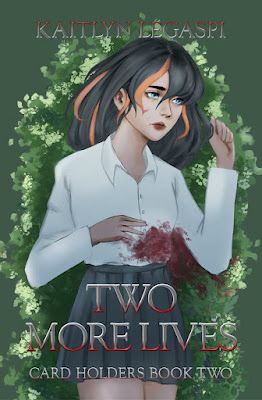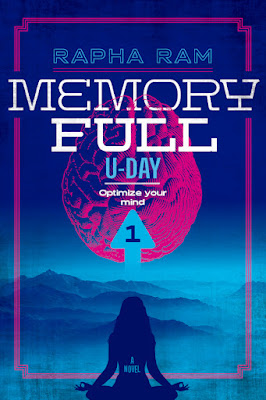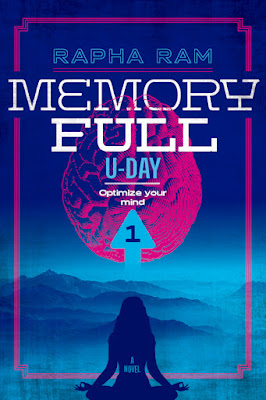Today, we have an opportunity to talk to Kaitlyn Legaspi. Kaitlyn has written the book, Two More Lives, Card Holders Book 2
First, let me thank you for joining me. I appreciate you giving me your links and I
want to share those with our readers.
Website and blog: Kibble Corner Writings – Welcome to
indie author Kaitlyn B. Legaspi's official site! (home.blog)
Instagram: Kaitlyn Legaspi
(@author.kaitlyn.legaspi) • Instagram photos and videos
Buy Link for all of my books: Links – Kibble Corner Writings
(home.blog)
That is great. Now, I almost NEVER read two books from the same Indie author but I loved your first book. And am so impressed you are still a college student. Can
you tell us a little about yourself?
I am the self-published author of the young adult fantasy trilogy, theDark Irregular Trilogy and Red Blood, the first of the six-book Card Holders series. I try my best to write on a daily basis, and I plan on adding more to my repertoire in the near future. Currently, I’m a fourth-year business undergraduate student at the University of Florida.
Very smart getting a business degree. Most people have no idea that writing today is owning your own small (or mid-size) business. How did you get into writing?
In addition to writing, I love singing, studying in boba tea shops, and reading whatever has caught my interest. Currently, I’m working on publishing the second book of her Card Holders series, Two More Lives, which is on pre-order
I didn’t get
into writing until I was in middle school, but I was an avid reader. Up until I
started writing, I was just happy reading the stories I’d pick off the shelves
of my school’s library. In middle school, I started watching Nickelodeon shows,
and decided to go to their website. There, I found the Message Boards, and a
category was writing. I scrolled through all the fanfiction and original
stories people my age were posting on the boards, and they inspired me to start
writing my own. I started off writing fanfiction, and Power Rangers: Samurai
was my first. My first original story, Dark Irregular, came soon
after, and I’ve been writing ever since.
What advice would you give someone who wants to be a
writer?
I’d say to be ready for criticism. This is the best advice
I’ve been given as a writer, and I think it’s the best piece of advice to pass
on. Not everyone is going to like what you write, and the quicker you realize
that, the faster you’ll be able to cope with any criticism that comes your way.
Of course, that doesn’t mean you shouldn’t take any constructive criticism into
consideration. The indie author community is so supportive, and if they
criticize my books in any way, unless it’s written as an attack, I’ll
automatically assume they want to help me improve my craft.
Do you write full-time or around another job? How do you
schedule your time to write?
I wish I could write full-time, but I can’t. This is my last
semester as an undergrad student, and I am set to graduate in April, so a lot of
my attention will be on passing my final courses. I also have an internship that
I work ten hours a week for, and I’m also a leader in my a cappella group,
which easily consumes at least five hours a week. Those five hours also only
cover rehearsal time and not the time I spend making plans and arranging music
for the group.
I don’t schedule my time to write, mainly because of my busy schedule, but if I ever end up having free time, I always use it to write. I’m in no rush to complete my current work-in-progress, though. Outside of my published and soon-to-be-published releases, I have seven completed first drafts that I’ll be able to work on. Right now, I’m happy to say that I’m writing stories for fun because of this.
What is your favorite part about writing?
My favorite part about writing is actually writing the story.
I can spend hours plotting and building the world, all the stuff that comes
before this step, but seeing all my plans come to life in an actual story is
the part I find most satisfying. It’s also fun seeing where my story goes,
especially if I tried planning it out beforehand. I started out as a pantser,
not plotting my books before I start writing them. Now, I’m a planster because
I have a tendency to write series, and I need to lightly plot in order to maintain
cohesion. I may outline, but they’re loose, and that gives me room to write up
what comes to mind and not be restricted by details that may be unnecessary. A
lot of the times, I surprise myself with what I write, and it’s all part of the
fun.
What
does literary success look like to you?
To
me personally, literary success looks like a reader fully enjoying my book and either
be sad that it’s over or wanting to read more. It’s also making my readers cry,
which sounds terrible, but my goal is to touch the hearts of my readers with
the stories I write. There are a lot of emotional scenes in my books, some of
which made me cry while writing them, so if I can make my readers cry along
with me, I consider that a huge win. If my readers have made any kind of
connection with one or a few or all of my characters, that to me is my literary
success.
Please tell us about your current release.
My current release is titled Two More Lives, and it’s
the second book of my young adult urban fantasy series Card Holders. It
takes place a few months after the first book, Red Blood, and expands on
the power system of the book. It also takes a deeper dive into main character
Neela’s story and features a lot more tournament fights
Can you read / provide us with a small exert?
This is from Chapter 15 of Two More Lives!
I woke up the next morning covered by a thick sheet of anxiety. The weight it placed on my body tried to pull me back down into my bed as I reluctantly sat up and sluggishly swung my legs over the edge of my bed. That heavy sheet seemed to cling to me, weighing down my feet with every step I took. Even my hands felt burdened by my troubled thoughts when I turned the knob to open the door to the bathroom. When I stood in front of the sink, I lifted my head, not even realizing that I’d been looking down the entire time. Then, I looked into the mirror. Finally, I cried.
From my hideous reflection, I saw that my eyes were still red and puffy from crying myself to sleep. The sorrow was so pronounced in my eyes that the electric blue hue they were known for had seemed to turn into a stormy blue-gray. The way I was frowning completed the picture that I saw: a weak, hopeless, worthless little girl. All I saw that morning… was a joke of a fighter, a leader… a human being.
What exciting story are you working on next?
I am currently working on the fourth book in a young adult
romance series called Bonds, and my boyfriend and I have actually started
editing the third book of the Card
Holders series, which I am aiming
to release in summer 2023.
Wow! That's amazing! What was the best money you ever spent as a writer?
The best money I’ve ever spent as a writer is the money
spent on applications to participate in book festivals. While the idea of
talking to strangers is still a bit daunting, book festivals are so much fun! You
get to meet other authors, and you get to meet potential readers and really get
the chance to market yourself along with your book. Book festivals have helped
me become comfortable talking to strangers and finding connections with people,
and seeing someone buy my book and showing their excitement at reading it gives
such a satisfying feeling.
One more time, where can someone go to purchase your book?
Add your links here
again
Website and blog: Kibble Corner Writings – Welcome to
indie author Kaitlyn B. Legaspi's official site! (home.blog)
Instagram: Kaitlyn Legaspi
(@author.kaitlyn.legaspi) • Instagram photos and videos
Buy Link for all of my books: Links – Kibble Corner Writings
(home.blog)








